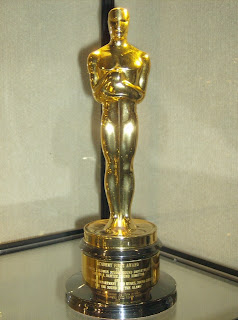
The Los Angeles Opera's production of Kurt Weill's
Rise and Fall of the City of Mahagonny is so much fun, it makes you sick. This 1930 German Expressionist theater piece, banned by the Nazis, tells the story of a group of depraved outlaws who end up stranded in the desert and decide to create their own sin city named Mahagonny (pronounced Ma-ha-GO-nee, if you weren't sure). They even put up their own "Welcome to Fabulous Mahagonny" sign, an exact replica of the famous entrance to Las Vegas.
The group succeeds in luring gold-rich miners from Alaska into staying in Mahagonny and spending their money on women, booze, glutony, and boxing to the death. It's all fun and games until everybody runs out of money. Then the town falls into utter misery, execution style. In Mahagonny, the worst crime possible is to not have any cash on hand: "In the whole human race there is no greater criminal than a man without money."
The big treat were the stars of the show: Audra McDonald and Patti LuPone, both legendary aritsts in the world of musical theater. Audra McDonald became the first person to earn three Tony awards before age 30, plus she earned a fourth for 2004's A Raisin in the Sun. Patti LuPone won a Tony for Evita and has been honored many times for her work on stage and screen, including the recent hit production of Sweeney Todd on Broadway. Both performers make their LA Opera debuts with this production at the Dorothy Chandler Pavilion.
Audra McDonald shatters her wholesome Broadway image with her saucy turn as Jenny Smith, the hottest and most expensive piece of ass in town. Ms. McDonald not only possesses the best voice of her generation, she burns up the stage in her sexy bordello bodice and six-inch high heels. Every note from her was pure gold and I wanted to hear her sing more songs than her part allows -- and she's the lead!
I felt chills every time Patti LuPone sang a note. Her distinctive tone is etched in my brain from her performances in Evita and Anything Goes and every other incredible thing she's done. I would have killed to see her in Sweeney Todd. Having conquered Broadway for decades, she recently started singing in opera companies. Her voice has matured so nicely, a perfect balance of Broadway brass with the rich warmth of a legitimate contralto, particularly on the high notes that she would have belted out in the past. Ms. LuPone skillfully inhabits her character, Leocadia Begbick the wicked bordello madame, with greedy surliness. She sounded amazing and did some kick-ass singing in her solos and in harmony with the other artists. She really held her own against the other opera singers.
All the singers were outstanding, especially the excellent tenor (Anthony Dean Griffey), the doomed hero who falls (and pays) for Jenny Smith. Jenny faithfully pleasures him until he runs out of money and then not even his Alaska miner buddies will loan him a dime. All the supporting roles and even the chorus were great. The chorus played a huge part in the show and they all sang very clearly together with perfect diction. The opera company plays Super-titles with the libretto above the stage, but you barely needed them because the elocution was so good.
I was lucky to get a rush ticket for $20 cash and the man at the box office gave me a great seat in the orchestra right section. It was my first time on the floor at the Chandler and damn it's worth the hundreds of dollars most people pay per ticket. I can only imagine what the Founders Circle just above the orchestra would be like. Actually, I got to sit up there once when I took a tour of the theater with a student group. It was really fun to see how the truly wealthy class live, even though there wasn't a performance on stage at the time.
This is not an easy show to endure. The music is demanding and suprising hummable despite some very challenging tonalities. I don't know how those singers held on to the vocal melodies with the orchestral "chaos" happening underneath them, under maestro James Conlon's expert conducting. Mr. Griffey in particular picked some unaccompanied notes right out the air and stayed in tune every time. It was quite impressive.
The most famous song from the show is the Alabama Song, famously revived by Jim Morrison and The Doors, and later covered by David Bowie. I was surprised to hear the song so early in the show - it's the second number - and to hear it sung by Jenny Smith and her troupe of vagabond prostitutes. "Oh show us the way, to the next whiskey bar/Oh don't ask why, no don't ask why."
Despite the outstanding performances and the innovatively sparse staging, the audience didn't stand for the curtain call. We cheered for the singers and we appreciated their efforts, but I think we were too exhausted and depressed to rise from our seats. The cynical themes of the show, raucously tongue-in-cheek in Act One, pummeled us into darkness and despair by the end of Act Two. As the people of Mahagonny declared after the hero's execution, "Nothing will help him or us or you now."




